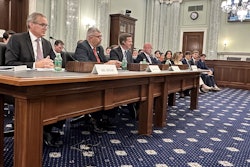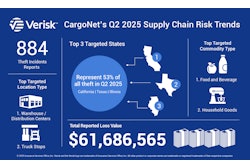
Two controversial proposals to require speed limiting devices on heavy-duty trucks have been withdrawn by the Federal Motor Carrier Safety Administration and National Highway Traffic Safety Administration.
The action was announced today in the Federal Register. It withdraws a joint rulemaking notice, which had been made in 2016. The FMCSA also is withdrawing an advanced notice of supplemental proposed rulemaking from May of 2022.
In the 2022 advanced notice, the agencies said the rule would impose speed limitations on certain commercial vehicles subject to the FMCSA regulations. Specifically, it proposed to require motor carriers to limit speeds for certain commercial motor vehicles operated in interstate commerce that were already equipped with an electronic engine control unit (ECU) capable of setting speed limits. The maximum speed of affected CMVs was to be determined by the rulemaking, and motor carriers would have been required to maintain that maximum limit in the ECU for the service life of the vehicle, according to the Federal register posting.
The original proposal was in response to petitions from the American Trucking Associations and a group of carriers. It would have required speed limiting devices on trucks weighing more that 26,000 pounds. It sought comments on having a maximum speed of between 60 and 68 miles per hour.
In its posting to the Federal Register, the FMCSA and NHTSA said, "The estimated economic impacts of the joint NPRM (Notice of Proposed Rulemaking) varied widely based upon the set speed, with annual costs ranging from $209 million to $1.561 billion. The Agencies also estimated that, at a 65 mph set speed, the proposed rule would save between 63 and 214 lives annually, monetized at between $716 million and $2.4 billion using both the value of statistical life in 2013 as well as economic costs and would also result in $848 million in fuel and emissions savings based on then-current price estimates."
The two agencies sought public input and received 7,225 comments to their 2016 proposal. When they posted their advanced notice of supplemental proposed rulemaking in 2022, they received 15,638, most of which opposed the rule.
The Federal Register posting listed eight reasons for the withdrawal of the proposed regulation. These, in general, related to cost, possible safety issues, a changing regulatory landscape, possible impact on driving times, and the impact on states to set speed limits.
The withdrawal comes on the heels of Transportation Secretary Sean Duffy's release of a package of pro-trucker policies, including a promise to end the threat of speed limiters.
Lewie Pugh, executive vice president of the OwnerOperator Independent Drivers Association commented on the change:
“The old ways of doing things in Washington are over. After nearly 20 years, big trucking’s proposed speed limiter mandate is dead. This failed proposal represented the worst of Washington and the worst of trucking: big corporations trying to use big government to undercut small businesses and increase corporate profits. Not only would this proposal have harmed working class Americans - small business truckers in our communities - it would have made our highways less safe for all motorists. We thank Secretary Duffy and the Trump Administration for listening to truckers by prioritizing safety, small businesses, and common sense.”











